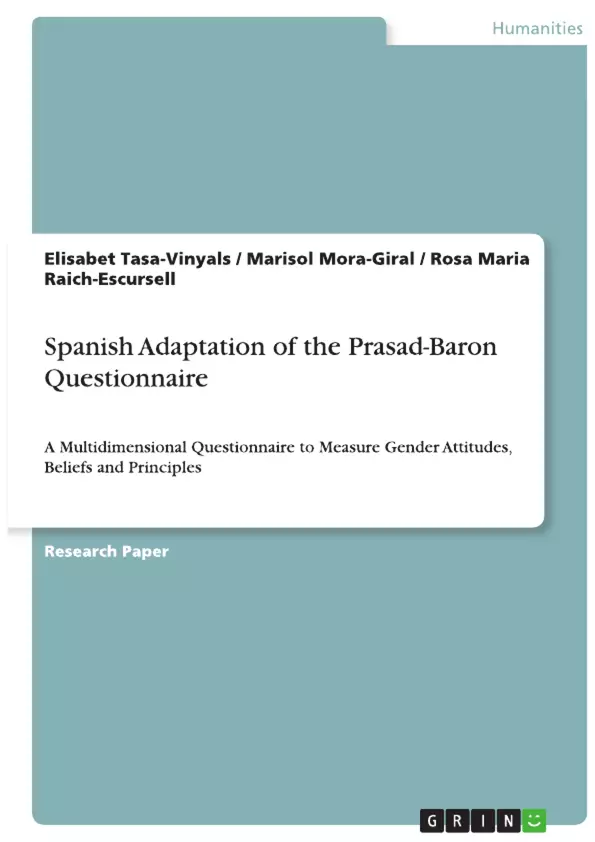Gender ideology plays an important role in human behaviour, and therefore its assessment, not only in particular areas but considering a wide variety of situations concerning both public and private life, is necessary.
This study presents the Spanish version of the questionnaire developed in 1996 by Prasad and Baron, a tool for measuring gender-role cognitions, and analyses its psychometric properties in a sample of 233 Spanish undergraduate students.
The questionnaire showed a 3-dimension structure -Equality, Belief and Principles- which coincided partially with the theoretical original one. Excellent reliability (Cronbach) results, of over .90, were found. Concurrent validity assessed with a measure of conservatism (E: r = -.253, p < .001; B: r = -.421, p < .001; P: r = -.123, p = .061) and with self-defined identification with feminism (E: F(2, 232) = 4.04,p=.019); B: F (2, 232) = 12.71,p< .001; P: F (2, 232) = 13.05,p< .001) was satisfactory. Scores in all dimensions differed by gender.
This study reveals satisfactory psychometric properties of the Spanish version of the Prasad-Baron questionnaire, making it an appropriate tool to obtain a complete assessment of gender ideology.
Table of Contents
- Abstract
- Introduction
- Methods
- Participants
- Tools
- Procedure
- Analysis
- Results and Discussion
- Preliminary and Descriptive Data Analysis
- Factor Structure and Internal Consistency
- Concurrent Validity
- Reliability
- Gender-Specific Analysis
- References
- Annex: Spanish Version of the Prasad-Baron Questionnaire
Objectives and Key Themes
This study aims to present the Spanish version of the Prasad-Baron questionnaire, a tool for measuring gender-role cognitions, and analyze its psychometric properties in a sample of Spanish undergraduate students. The study focuses on examining the reliability and validity of the translated questionnaire and its ability to capture the nuances of gender ideology within the Spanish context. The study also seeks to investigate how the questionnaire measures different aspects of gender ideology, such as attitudes, beliefs, and principles.
- Translation and adaptation of the Prasad-Baron questionnaire into Spanish
- Psychometric properties of the Spanish version of the questionnaire
- Assessment of gender ideology in a sample of Spanish undergraduate students
- Analysis of the reliability and validity of the translated questionnaire
- Exploration of the three-dimensional structure of gender ideology – Equality, Belief, and Principles
Chapter Summaries
The Introduction provides a thorough overview of existing tools for assessing gender attitudes and highlights the need for a comprehensive instrument that captures various aspects of gender ideology. The study focuses on the Prasad-Baron questionnaire, which aims to measure attitudes, beliefs, and principles related to gender roles. The study argues that the questionnaire is particularly valuable because it assesses these components separately, offering a complete understanding of an individual’s gender ideology. The Methods section details the research design and methodology, outlining the participant characteristics, the instruments used, the data collection procedures, and the analytical approaches employed.
Keywords
The key keywords and focus topics of this research include gender attitudes, sex role attitudes, psychological assessment, and psychometrics. The study explores the development and validation of a Spanish translation of the Prasad-Baron questionnaire, a multidimensional tool designed to measure gender attitudes, beliefs, and principles.
Frequently Asked Questions
What is the Prasad-Baron Questionnaire?
It is a tool developed in 1996 to measure gender-role cognitions, focusing on attitudes, beliefs, and principles regarding gender ideology.
What are the three dimensions of the Spanish version?
The Spanish adaptation identified a three-dimensional structure: Equality, Belief, and Principles.
Is the Spanish version of the questionnaire reliable?
Yes, the study found excellent reliability with Cronbach's alpha results of over .90.
How was the validity of the questionnaire tested?
Validity was assessed by comparing results with measures of conservatism and self-defined identification with feminism.
Does gender influence the scores in the study?
Yes, the study found that scores in all dimensions significantly differed by gender among the undergraduate students sampled.
- Quote paper
- Elisabet Tasa-Vinyals (Author), Marisol Mora-Giral (Author), Rosa Maria Raich-Escursell (Author), 2015, Spanish Adaptation of the Prasad-Baron Questionnaire, Munich, GRIN Verlag, https://www.grin.com/document/309370



